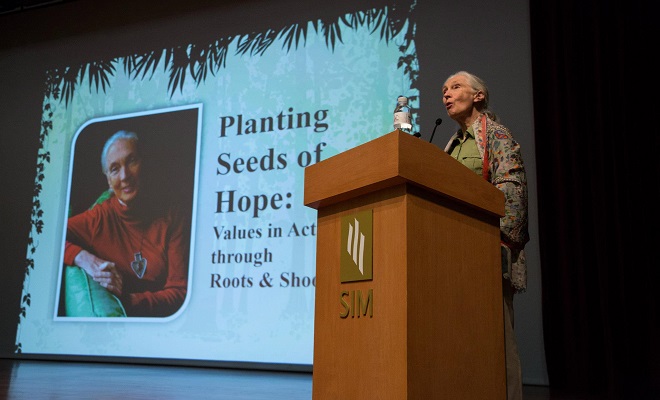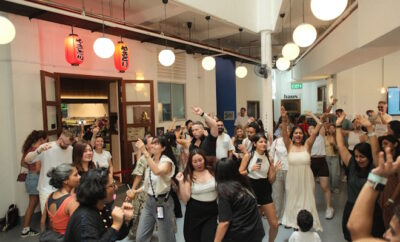 SIM University
SIM University
Insights + interviews
In Conversation With Dr. Jane Goodall
Celebrating the 55th anniversary of her groundbreaking research with chimpanzees, Dr. Jane Goodall talks about her life.
2015 marks 55 years since a young Englishwoman first set foot on the shores of Lake Tanganyika, in what is now Tanzania’s Gombe National Park. Now 80-years-old, the chimpanzee behavioral researcher Dr. Jane Goodall continues to soldier on, as she endeavors to empower people to make a difference for all living things. “There’s still a lot worth fighting for,” she says, and the genial lady has not lost her steely determination to make a difference in this world we call home. We had a chat with Dr. Jane to find out more about her life.
AA: 2015 marks the 55th anniversary of your arrival in Gombe, Tanzania, and all that has resulted from your ground breaking research on chimpanzees. Any thoughts about this anniversary?
JG: We hope to capitalise on this milestone – 55 years studying one population of chimpanzees, our closest relatives, by spreading awareness about the plight of chimpanzees in the wild in Africa, sharing information from our long term studies, and raising money to improve the infrastructure at Gombe, create a visitor reception centre where visitors can learn more about Gombe, and how they can help to conserve the famous chimpanzees. Quite honestly, I am amazed by the fact that we have been able to continue the research, without a break, from 1960 to the present day, and by the fact that we are still learning new things about these amazing chimpanzees.
AA: How do you think your vision and mission has expanded since then?
JG: From 1960 to 1986 I spent most of each year at Gombe, studying the chimpanzees, living my dream life. Then, at a conference at which we brought together all those studying chimpanzees in Africa, I realised (during a session on conservation) that chimpanzees were decreasing in numbers throughout their range, due to deforestation and hunting. I knew I had to leave the life I loved, and do what I could to help chimpanzees, both in the wild and in captivity. Since October 1986 I have not been in one place for more than three consecutive weeks, spending some 300 days a year on the road – raising awareness about the plight of chimpanzees. Then, five years later, I flew over the tiny Gombe National Park (In Tanzania) and realised the full extent of the terrible deforestation. Gombe had been part of a contiguous belt of rainforest along the eastern shore of lake Tanganyika. From my small plane I looked down and saw that Gombe was a small island of forest, surrounded by completely bare hills. This is when I realised that if we did not improve the lives of people living around the last area of forest, we could not even try to save the chimpanzees. So began our Take Care – TACARE programme that improves the lives of people living around the national park in a holistic way. The programme is so successful, it is now replicated in five other African countries around wilderness areas. And, as a result , the bare hills are now covered with trees.
I also began travelling around the world talking about the problems faced by the primates, some of which include the orang utans and gibbons – living in the rainforest and the problems faced by communities struggling to survive. I also started to learn more about the ways we humans are harming the environment, with our reckless burning of fossil fuels, pollution, the unsustainable life styles of the ‘western’ word and the detrimental effects of the exploding human population. In the process, I’ve met many young people who had not much hope for the future, this is why I started the Roots & Shoots programme.
AA: Tell us more about Roots & Shoots and its work to educate and empower youth. Apart from focusing on the youth, is there any way to get the older folks more involved as well?
JG: So much depressing, negative news around us. Not surprising there are young people who do not have much hope, and I have been encountering those who seem depressed, angry or apathetic. They tell me that we have compromised their future, and there is nothing they can do about it. This is what led to the start of Roots & Shoots, a programme that empowers young people to get together and make a difference in the world. This program, which started with 12 high school students from nine Tanzanian schools, is now in more than 130 countries, with 150,000 or so GROUPS, with members from kindergarten through university. And each group discusses local problems (such as stray dogs or cats, invasive species in some habitat, endangered wildlife, street children, the homeless and so on), and then they decide on the three projects they will do to address some of these problems. Projects that will make the world a better place, for people, other animals and the environment. The main message for R&S members: “Every individual makes a difference – every day. And we have a choice – what sort of difference will we make?” More and more adults want to become involved, and we have R&S group among the staff of corporations, in retirement homes, in prisons and so on.
AA: You are such a tireless advocate for conservation. What do you think is the source of all your energy and passion? What drives you?
JG: I love the natural world and I love animals. We have inflicted so much harm on the environment and biodiversity. I want to help heal some of the scars before it is too late.
AA: I run a web site called activeage.co and a lot of people think of you as that living legend that seems to get more active and vibrant than ever. How has your passion influenced your outlook towards actively ageing?
JG: I find it hard to believe I have been on this planet for 80 years! I still have energy, I have good genes – quite honestly, I do not think about ageing – except when I am frustrated because I cannot leap up from sitting on the ground in the way I once could!
AA: What will be your advice to someone who wants a mid-career switch into conservation?
JG: It is never too late to move your life in a new direction. Some people, at a certain age, realise that they have spent too much time trying to acquire more and more money, and that this is not fulfilling. We need money to live – things go wrong when we live for money, in and of itself. It is great if you are really good at making money, and enjoy it – so long as the money is used to make the world a better place (such as donating some to JGI!)
AA: What is the most important point you would like to raise awareness about right now? Where is the most important area for change?
JG: One major problem is that people look around them and begin to realise how we have damaged the planet. Everything seems hopeless, and they feel helpless. What can an individual do to make a difference? The thing is, that one person alone can hardly make a difference, but if people begin to think about the consequences of the small choices they make each day – what they buy, what they eat, how they interact with other people, animals and so on – then they are likely to make more ethical choices. And millions of small ethical choices will move us in the right direction. One issue most people are not aware of, is the danger of eating a lot of meat. This is harmful to human health (bacteria have built up resistance to the antibiotics that must be routinely fed to animals in intensive farms just to keep them alive), and also substances used to boost growth such as hormones can enter our bodies. It is harmful to the environment – huge areas of forest are cut annually to grow grain to feed the billions of animals raised for us to eat, and this releases carbon dioxide (CO2) which is the main component of the greenhouse gases that are leading to climate change, and the animals produce methane during the process of digestion, and this is an even more potent greenhouse gas than CO2. Secondly, huge amounts of water are used turning plant protein into animal protein. Last but not the least, there is the almost unbelievable cruelty involved in the feed lots, factory farms, slaughter houses, and so on. The animals we eat have personalities, minds and emotions, and feel fear and pain, just as our pets do, just as we do.
AA: What is your wish for conservation in the future?
JG: That multinational corporations start thinking about the consequences of their decisions for future generations, and not just for the corporate bottom line, that corruption be stamped out, and the unholy alliance between big business and politicians come to an end. We must start to learn how to respect other life forms. The three main problems – poverty, the ‘western’ unsustainable life style, and human population growth must all be addressed.
AA: Last but not the least, what do you think is your legacy and what would you like to be remembered most for?
JG: I hope that the movement to attain a critical mass of young people who understand the importance of money, yet realise that one should not live for money, will continue to grow. I would like to be remembered as the one who has helped people understand the true nature of animals – that is part of and not separated from the rest of the animal kingdom.
AA: Thank you so much for your time Dr. Jane.
JG: You are most welcomed.
For more information about Dr. Jane Goodall, please refer to the Jane Goodall Institute Singapore website.









